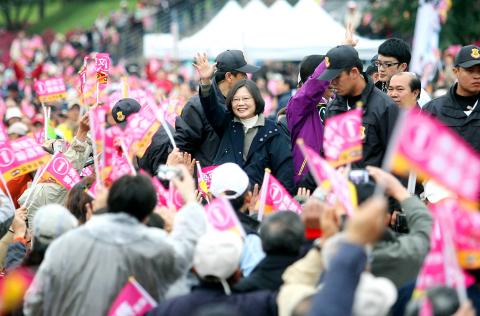Democratic Progressive Party (DPP) presidential candidate Tsai Ing-wen (蔡英文) bid farewell to 2011 yesterday, saying she would make Taiwan a better country through justice and fairness if she were elected president on Jan. 14.
“Next year will be a special year, because we are going to have a female president — a president who knows how to face the tasks at hand and solve them, who can eliminate unfairness and injustice in society,” she said at a rally in Tucheng District (土城), New Taipei City (新北市).
“Are you ready?” she asked more than 10,000 flag-waving supporters who braved the cold and rain — temperatures as low as 14oC — and collectively responded “Yes!”

Photo: CNA
The DPP chairperson had a hectic schedule on the last day of the year, campaigning in New Taipei City’s Sindian District (新店) and Tucheng in northern Taiwan, before heading south to Greater Kaohsiung and Greater Tainan.
New Year’s Eve marked the two-week countdown to Election Day as well as the end of an unhappy year, during which Taiwanese had been plagued by a high unemployment rate, slow economy and government inefficiency, Tsai said.
“I shook hands with many of you just now. Most of those hands were cold because you have been here for so long, but I know your hearts are warm and yearning for change. Your voices are heard,” she said.
Her administration would fulfill people’s humble wishes — to have a quality job and an apartment, raise children and take care of their parents — obligations for any government, but have been ignored by the current administration, she said.
Tsai told supporters of her plans to establish a long-term social care system and implement a 12-year compulsory education as well as an employment-driven economy, which highlights developing local markets and accelerated integration with the global community.
“We have a complete set of policies to eliminate the gap between the rich and the poor, the gap between urban and rural areas, and imbalanced regional development,” she said.
Harmony would be the central theme of her administration in both domestic and external issues, Tsai said, as her initiative of a “Taiwan consensus” does not rule out any option, including unification with China, which has been advocated by the Chinese Nationalist Party (KMT), she added
“Rest assured, there is one thing we will definitely do, which is to improve government efficiency. And we will not capitalize the state apparatus and exploit it as a campaign tool to oppress political opponents,” Tsai said, referring to a report that alleged monitoring activities on her campaign by intelligence authorities.
Tsai said she has high hopes for New Taipei City, the nation’s largest electoral district, which has more than 3 million voters and where she lost by 5.3 percent, or about 110,000 votes, in a mayoral election last year, adding that she felt that “the tide is turning.”
Tsai then traveled south for night rallies in Kaohsiung and Tainan, where she was to attend a New Year countdown party and spend the night before attending a flag-raising ceremony this morning.

Taipei has once again made it to the top 100 in Oxford Economics’ Global Cities Index 2025 report, moving up five places from last year to 60. The annual index, which was published last month, evaluated 1,000 of the most populated metropolises based on five indices — economics, human capital, quality of life, environment and governance. New York maintained its top spot this year, placing first in the economics index thanks to the strength of its vibrant financial industry and economic stability. Taipei ranked 263rd in economics, 44th in human capital, 15th in quality of life, 284th for environment and 75th in governance,

Greenpeace yesterday said that it is to appeal a decision last month by the Taipei High Administrative Court to dismiss its 2021 lawsuit against the Ministry of Economic Affairs over “loose” regulations governing major corporate electricity consumers. The climate-related lawsuit — the first of its kind in Taiwan — sought to require the government to enforce higher green energy thresholds on major corporations to reduce emissions in light of climate change and an uptick in extreme weather. The suit, filed by Greenpeace East Asia, the Environmental Jurists Association and four individual plaintiffs, was dismissed on May 8 following four years of litigation. The

A former officer in China’s People’s Liberation Army (PLA) who witnessed the aftermath of the 1989 Tiananmen Square massacre has warned that Taiwan could face a similar fate if China attempts to unify the country by force. Li Xiaoming (李曉明), who was deployed to Beijing as a junior officer during the crackdown, said Taiwanese people should study the massacre carefully, because it offers a glimpse of what Beijing is willing to do to suppress dissent. “What happened in Tiananmen Square could happen in Taiwan too,” Li told CNA in a May 22 interview, ahead of the massacre’s 36th anniversary. “If Taiwanese students or

The New Taipei City Government would assist relatives of those killed or injured in last month’s car-ramming incident in Sansia District (三峽) to secure compensation, Mayor Hou You-yi (侯友宜) said yesterday, two days after the driver died in a hospital. “The city government will do its best to help the relatives of the car crash incident seek compensation,” Hou said. The mayor also said that the city’s Legal Affairs, Education and Social Welfare departments have established a joint mechanism to “provide coordinated assistance” to victims and their families. Three people were killed and 12 injured when a car plowed into schoolchildren and their